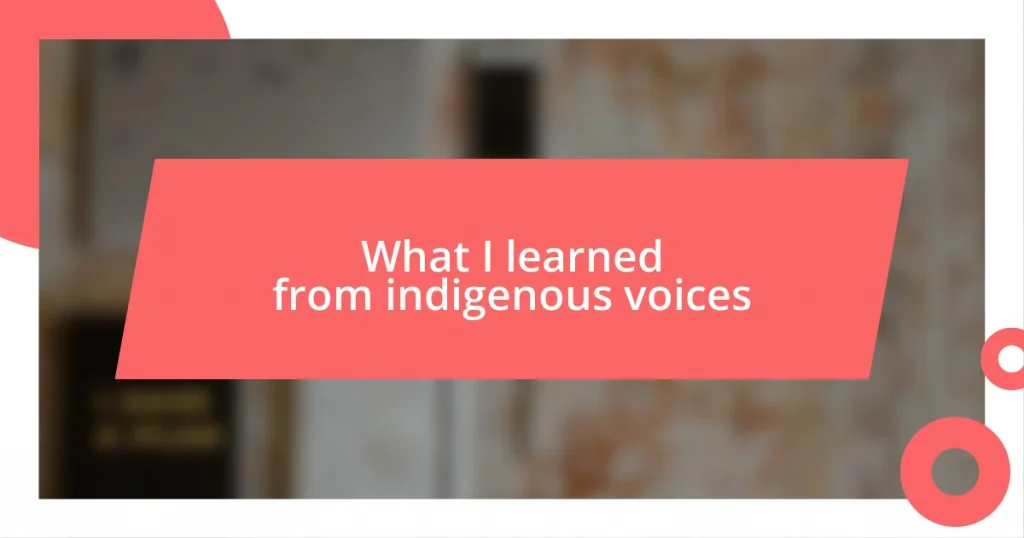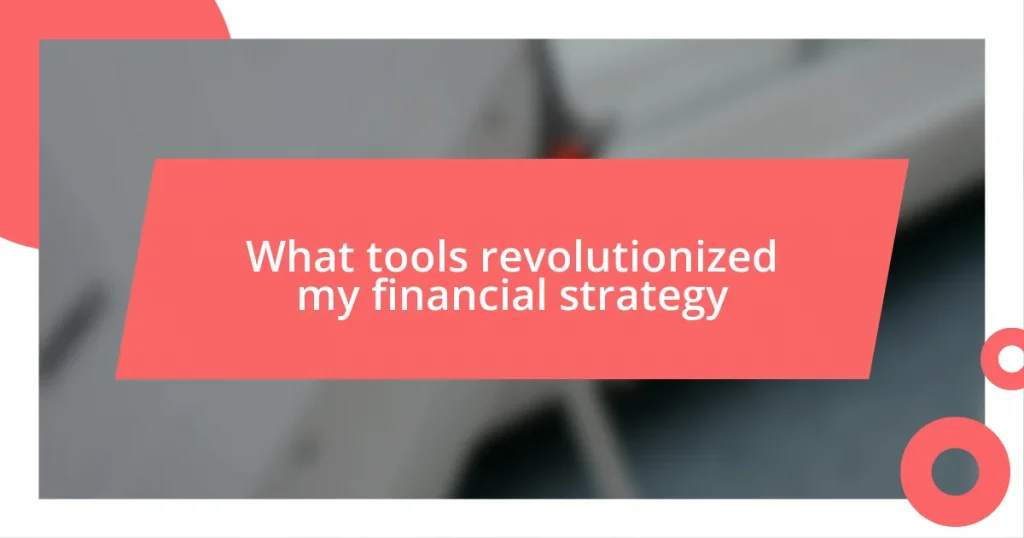Key takeaways:
- Listening to Indigenous voices fosters deeper understanding and empathy, emphasizing the importance of shared experiences and cultural histories.
- Oral traditions impart valuable life lessons about resilience, guidance, and the interconnectedness of all beings, shaping community identity.
- Integrating Indigenous perspectives into modern practices and education enhances community responsibility and promotes sustainable living.

Understanding Indigenous Voices
When I first began to immerse myself in Indigenous voices, I was struck by the profound connection these communities have to the land. It made me realize that their stories are not just tales of culture but an intricate part of their identity and survival. How often do we stop to consider how our own backgrounds shape our perspectives?
One conversation I had with an Indigenous elder opened my eyes to the deep wisdom embedded in oral traditions. He shared a story about the seasons, emphasizing how each moment holds lessons for the future. That left me pondering: If we took the time to genuinely listen, what wisdom could we uncover from those who have lived in harmony with nature for generations?
I often reflect on how understanding Indigenous voices has transformed my view of community and responsibility. The emphasis on collective well-being has challenged my individualistic mindset, urging me to explore how my actions impact the larger ecosystem. Isn’t it fascinating to think about how these lessons can guide not just personal growth but also how we interact with each other and the world around us?

The Importance of Listening
Listening is not merely about hearing words; it’s about truly absorbing the message and essence behind them. I recall sitting in a circle during a community gathering, where Indigenous elders shared their experiences. As I listened, I felt a shift within me—a recognition that their stories were woven with wisdom that transcended time. This realization highlighted how listening fosters a deeper understanding of diverse perspectives and cultivates empathy.
- Listening allows for a fuller appreciation of cultural histories and traditions.
- It opens up avenues for dialogue, bridging generational gaps and fostering connections.
- Through active listening, we can learn to respect and honor the relationship some communities have with the natural world.
Each moment spent in attentive silence offered me insights that I never would have encountered in my usual rush to speak. The experience reaffirmed that in our fast-paced lives, it’s vital to create space for stillness and reflection.

Lessons from Oral Traditions
Oral traditions offer a treasure trove of insights, often encapsulating complex life lessons in seemingly simple stories. I remember a chilly evening by the fire when a community member shared a tale of a young animal that learns to navigate its environment through the guidance of its elders. It struck me how this story mirrored our own journeys, emphasizing the importance of seeking guidance and wisdom from those who have walked similar paths. Aren’t there moments in our lives when we could all benefit from that kind of guidance?
Through these narratives, I’ve learned that oral traditions serve as a vibrant tapestry of community identity. They transmit values such as resilience, patience, and nurturing the connections between generations. I was particularly moved when an elder recounted a story of surviving hardships, showcasing the strength of unity and the role of shared history in healing. It made me reconsider how I often take these lessons for granted in my day-to-day life.
There’s something deeply profound about how oral traditions emphasize the interconnectedness of every being. A storyteller once described the balance of nature in a beautiful metaphor: we are all threads in a vast tapestry. This resonated with me, as it reminded me that our stories, just like those of Indigenous peoples, have the power to weave us together in meaningful ways. It’s a gentle nudge to recognize that every individual narrative contributes to the greater picture of human experience.
| Oral Tradition | Lesson Learned |
|---|---|
| Young Animal’s Journey | Importance of Seeking Guidance |
| Resilience in Hardship | Strength of Unity and Shared History |
| Interconnectedness | Power of Individual Narratives in Community |

Cultural Perspectives on Community
Cultural perspectives on community often emphasize the importance of belonging and collective responsibility. I remember attending a potluck dinner organized by a local Indigenous group. Each dish shared was a piece of someone’s family history, and this realization hit me hard. How often do we think about food not just as sustenance, but as a living representation of our connections to one another? It inspired me to appreciate how community gatherings serve as a canvas for storytelling and understanding, weaving together diverse backgrounds into a cohesive narrative.
In discussions about community, I often find myself reflecting on the concept of “relationality.” One elder shared that relationships aren’t merely about individual bonds but are integral to the well-being of the entire community. This perspective made me think about my own interactions. Are they just surface-level, or do they contribute to a richer tapestry of support and cooperation? For me, understanding that we are all interconnected shifted how I approach my relationships—seeing them as a shared responsibility rather than mere transactions.
Moreover, the emphasis on interdependence within Indigenous cultures has reshaped how I perceive challenges as well. Observing a community’s collaborative efforts during a seasonal celebration made me realize that facing hardships together enhances resilience. I couldn’t help but wonder if we all approached our individual challenges with the same community-minded spirit, how much stronger would we be? It’s a beautiful reminder that in unity, we find not just strength but a deeper sense of purpose.

Environmental Knowledge and Stewardship
Sitting quietly by a river during my time with an Indigenous community, I was struck by how they harness environmental knowledge imparted through generations. I listened as a local elder described the seasonal changes and how they dictate the efficient harvesting of plants and fish. This wisdom, refined over countless seasons, made me rethink my own relationship with nature. Could we all benefit from such attunement to the environment, where our activities align with its rhythms rather than disrupt them?
One day, I observed a group of young people actively participating in a river clean-up, led by seasoned community members who shared stories of the river’s historical significance. The aim was not just to clean but to foster a sense of responsibility for the land. Witnessing their passionate discussions about plant medicine and sustainable practices left me pondering my own impact. Are we doing enough to preserve the natural world for future generations? It made me realize that stewardship is more than just a task; it’s about cultivating a profound respect for every element of our ecosystem.
I often reflect on the astonishing ways Indigenous practices exemplify a deep understanding of environmental stewardship. Their holistic view integrates spiritual, cultural, and practical dimensions, reinforcing that land is more than resource—it is a living entity. I remember feeling inspired when a community member said, “The land speaks, but are we listening?” That question lingers in my mind, reminding me to pay attention not only to what I see but to the stories and teachings that nature offers us.

Empowerment through Storytelling
Storytelling in Indigenous cultures serves as a powerful tool for empowerment, offering connections that transcend time and space. I remember sitting around a fire, listening intently as an elder shared tales of resilience and survival. Each story was more than mere entertainment; it was a lesson steeped in history, reminding me how narratives hold the power to shape identity. Have you ever considered how your own stories influence who you are?
In these intimate gatherings, I felt a palpable sense of empowerment. As each voice rose to share personal experiences, I noticed how sharing created a communal bond. It was inspiring to witness individuals reclaiming their narratives, articulating hardships and triumphs alike. I found myself wondering, how often do we allow our own stories to be told? Each shared moment breathed life into a collective spirit, affirming that our stories are essential threads in the fabric of community.
Reflecting on this experience, I now view storytelling as more than just a cultural practice; it’s a pathway to healing and empowerment. Each narrative carried the weight of ancestry and future hope. Hearing how others overcame adversity made me consider my own hurdles. Isn’t it empowering to realize that through storytelling, we not only uplift ourselves but also extend a hand to lift others? Sharing and listening redefine our understanding of struggle and strength, reminding us that every story matters.

Integrating Indigenous Perspectives Today
Integrating Indigenous perspectives into our everyday lives can profoundly shape our understanding of community, responsibility, and sustainability. I was once part of a workshop where Indigenous leaders discussed the importance of land stewardship in urban environments. As I listened to them, I felt a sense of urgency; what if we took their practices and adapted them to our modern lifestyles? Imagine if cities could reflect Indigenous values of interconnectedness rather than mere expansion.
In my own community, we initiated a collaboration with local Indigenous groups to incorporate traditional ecological knowledge into urban planning. At a meeting, I watched as participants from both sides exchanged ideas, and it reminded me how enriching it can be when diverse voices come together. The pressing questions of how to honor the land while catering to growth became clearer. Are we ready to embrace these teachings as a shared responsibility, rather than an obligation?
There’s something incredibly powerful about infusing Indigenous wisdom into our education systems, too. I remember a class where we discussed the significance of storytelling in passing down knowledge; it truly resonated with me. It’s not just about books or lectures, but rather creating an interactive space where Indigenous narratives are valued and taught. Could this be a game-changer in fostering empathy and understanding among younger generations? Integrating these perspectives today doesn’t just enrich our education; it lays the foundation for a more inclusive society.















